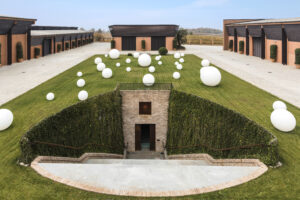
The wine world bids farewell to one of its most unconventional celebrities. He was an absolutely excellent wine producer, between Val d’Orcia, at Tenuta di Trinoro, and Etna, at Passopisciaro, as well as “wine philosopher” and connoisseur of wine territories all over the entire world, understanding, loving and producing both the great International vines and the vines of ancient cultivation in Italy. Andrea Franchetti has died at 72, succumbed to an incurable disease, last night in his home in Palazzo Colonna in Rome. He leaves four children, Cody, Benjamin, Giordano and Baldassarra, to whom we extend our deepest condolences.
He was the son of an American mother and Italian father, raised in Rome in an environment of artists, including his uncle Cy Twombly. Andrea Franchetti grew up with experimentation and research in his blood. At eighteen, he left home and went to Afghanistan by bicycle, then he moved to New York in the East Village, in the 1960s. Later on, he opened restaurants in Rome and in the Marche, and then returned to New York in the Eighties and dedicated his livelihood to importing fine Italian wines, which at that time began appearing on the International scene.
His adventures as a wine producer began in the 1990s, as stated in “Vini Franchetti”, when he began to restore the ruins of an ancient fortified country house immersed in the Val d'Orcia, which is now a UNESCO World Heritage Site. It was a no man’s land on the border of Tuscany and Lazio lacking any winemaking traditions. He decided to plant vineyards, but having no agronomic techniques, he went to Bordeaux where he learned the art and philosophy of making wine from the great masters, such as Peter Vinding, Peter Sisseck, Alain Vauthier from Ausone and Luc Thunevin from Valandraud. In 1991, he planted the first vineyards using the cuttings he brought from Bordeaux and in 1997, after a few years of experimentation, he produced the first vintage of Tenuta di Trinoro, which was immediately well received by International critics.
Then in 2000, he visited Sicily and it was love at first sight with Etna, where he started by restoring from scratch an ancient typical Sicilian structure for winemaking that became the heart of Passopisciaro. “Through restoring the old Nerello Mascalese vineyards and planting new vineyards of non-native varieties, such as Petit Verdot, Cesanese di Affile and Chardonnay, and together with a handful of other pioneers, he contributed to the enological renaissance of the Etnea area. Andrea Franchetti was one of the first to recognize the potential of individual lava terroirs composed of distinct lava flows, and he introduced and promoted the concept of Contrada wines, modeled after the Burgundy crus. Among the many results Franchetti achieved on Etna, in addition to creating Contrada wines, he also create the acclaimed International wine festival, “Le Contrade dell’Etna””.
Andrea was a free and charismatic man, unforgettable for those who had the good fortune to know him, who explained his idea of wine. “I love making wine. It is a work of art that changes every year. During the vintage one is influenced by the landscape of the place where the wine is made. The impressions communicated by the daily natural scenery, and the changing seasons, are collected and transmitted to the wine. So first of all, wine is different every year. Secondly, as I change, my way of making wine also changes. Wine bears the signature of those who make it. Wines are very similar to the producer who made them.
At first you relax, you just need to focus on viticulture and there is plenty of time to learn, since the plants will go into production after 4-5 years. Then comes the harvest, which is the most difficult part to decide, you need a lot of experience to understand when the ripening is complete - not too early and not too late. One day can change your wine completely. Then there is fermentation and all the hundreds of subsequent phases to manage, all of them requiring the right decisions and they all accumulate to infuse the wine with a style. It is too complicated to describe everything, but it is bottled about twenty months later. The first few times I often panicked. But I had talent and good teachers, people I could call on when needed”.
“Those who knew him will not forget Andrea Franchetti”, is the WineNews director Alessandro Regoli’s personal memory, “he was one of the most nonconformist personalities in the wine world, and one of the greatest wine connoisseurs in the world. I remember him at the end of the Nineties, and he astounded me many times when he hosted us at his Trinoro Estate, with a group of “friends” (Angelo, Lamberto, Vittorio, Otto ...), directed by Gelasio Gaetani Lovatelli d’Aragona, Andrea Franchetti’s cousin. Those were moments of conviviality and discussion, where many wines from all over the world were tasted, both from famous terroirs and not. He was a man of universal sincerity, a lover of International varieties, but also of great Italian native wines, as he describes his experience after Trinoro in Valdorcia, with Nerello Mascalese on Etna. Now, we have been told, he was in the midst of carrying out his latest project, reconstructing an ancient Roman style house in Scicli, Sicily, where he would have retired. I want to remember him with a wine, one of the greatest pure Cabernet Francs I’ve ever tasted in Italy, which he produced for friends, on a black and white label, which I tasted several times with him on the splendid terrace overlooking the Val d’Orcia of Castiglioncello del Trinoro. He was a “wine philosopher” who had an open, universal, and immense wine culture”.
Copyright © 2000/2025
Contatti: info@winenews.it
Seguici anche su Twitter: @WineNewsIt
Seguici anche su Facebook: @winenewsit
Questo articolo è tratto dall'archivio di WineNews - Tutti i diritti riservati - Copyright © 2000/2025